
Media Matters
Radio Segments
2019 Segments & Before
(Photo courtesy of Backbone Campaign)
Radio Documentaries:
Sacrifice Zones (2017) Producer/Director, Barbara Bernstein, KBOO Radio, Portland
Directed/Produced by Barbara Bernstein, KBOO Radio (90.7) Portland, “SACRIFICE ZONES is a story about the pressure to transform a region of iconic landscapes and environmental stewardship into a global center for shipping fossil fuels. This one-hour radio documentary investigates how petrochemical development of the scale being proposed for the Pacific Northwest threatens the region’s core cultural, social and environmental values. And it shows how opposition to these proposals has inspired the broadest and most vocal coalition of individuals and groups ever assembled in the Northwest, a Thin Green Line of opposition that has so far slowed or stopped all the fossil fuel projects being proposed.
In SACRIFICE ZONES we hear from Native American tribes, longshoremen, environmentalists, business leaders, health care professionals, first responders and local residents along the blast zones of oil trains and terminals, who are raising their voices in public hearings, court proceedings, rallies and marches.
Fighting Goliath (2014), Producer/Director, Barbara Bernstein, KBOO Radio, Portland
“The Canadian Tar Sands is the largest industrial project on earth. These deposits of a sand-embedded solid form of low-grade oil cover an area the size of Florida. Everything about the this project in the northeast corner of Alberta is enormous: sprawling open pit mines collectively the size of a large metropolitan area; mining equipment the height of a three story building; toxic tailings ponds that can be seen from outer space. But people far from Alberta are also starting to feel the effects of the tar sands’ massive footprint that includes inputs and outputs stretching across Canada, through the heartland of the United States, down the Pacific coast and across the Northern Rockies and Pacific Northwest. FIGHTING GOLIATH looks at the frenetic exploitation of the Canadian tar sands and its rippling effects across the continent.”
Radio Segments
Teaching Climate Justice
Airdate: September 23, 2019, KBOO Radio, Portland, OR
Produced by Desiree Hellegers for “Old Mole Variety Hour”
As we move into the week-long youth climate strike, Desiree Hellegers speaks with Bill Bigelow and Tim Swinehart of Rethinking Schools about the impacts of Portland Public School’s landmark climate justice resolution and its role in fueling fossil fuel resistance and empowering students to become activists and leaders for social and environmental justice. Bigelow and Swinehart are authors of the curriculum for climate change: A People’s Curriculum for the Earth.
Extinction Rebellion/Sunrise Movement
Airdate: July 8, 2019, KBOO Radio
Produced by Desiree Hellegers for “Old Mole Variety Hour”
Desiree Hellegers brings voices from the June 21 Extinction Rebellion/Sunrise Movement action in downtown Portland. Voices from the June 21 Extinction Rebellion/Sunrise Movement rally in downtown Portland that culminated with activists blocking the street in front of Portland City Hall for several hours. Among the activists’ demands was a call for Mayor Wheeler to declare a climate emergency, halt Xenith Energy’s transport of Tar Sands oil through Portland and the proposed freeway expansion.
Climate Change Rally
Airdate: June 17, 2019, KBOO Radio
Produced by Desiree Hellegers for “Old Mole Variety Hour”
Desiree Hellegers brings audio highlights from the June 4 rally in Pioneer Courthouse Square in support of the Children’s Trust climate justice lawsuit Juliana v. United States. The landmark case being argued in front of the Federal Court of Appeals for the Ninth Circuit asserts the youth plaintiff’s right to a habitable planet and that the plaintiffs are being deprived of their “rights to life, liberty, property, and public trust resources” by the federal government. The segment begins with Portland City Commissioner Jo Ann Hardesty.
Heavy Nettle: Music for the climate
Airdate: December 31, 2018, KBOO Radio
Produced by Desiree Hellegers for “Old Mole Variety Hour”
Desiree Hellegers talks with three of the four members of the Portland band Heavy Nettle — Tara Hopebringer, Jordan Mac Intyre, and “Sweet Potato“ — about their organizing work and their songs on climate change, community and resistance.
No on 105; Rise for Climate, Jobs, Justice
Airdate: August 27, 2018, KBOO Radio
Produced by Desiree Hellegers for “Old Mole Variety Hour”
Desiree Hellegers speaks with OPAL organizer Maria Hernandez Segoviano about Measure 105 and the September 8 “Rise for Climate, Jobs and Justice” National Day of Action, co-sponsored by Oregon Just Transitions.
Oregon Politics and Climate
Airdate: August 20, 2018, KBOO Radio
Produced by Desiree Hellegers for “Old Mole Variety Hour”
Desiree Hellegers interviews fossil fuel activist Bonnie McKinley about the global climate implications of the Oregon governor’s election. She also speaks with Shawn Fleek of OPAL Environmental Justice about the Oregon Just Transition’s upcoming event, “Rise for Climate, Jobs and Justice.”
Mosquito Fleet Protests Pipeline
Airdate: May 28, 2018, KBOO Radio
Produced by Desiree Hellegers for “Old Mole Variety Hour”
Field Mole Desiree Hellegers speaks with canoe families and kayaktivists who were in Seattle on May 20 for an Indigenous-led day of resistance to the Kinder Morgan Trans Mountain pipeline, which would carry oil from the Alberta Tar Sands to tankers in the port of Burnaby, British Columbia, just outside Vancouver, B.C. Follow this link for more about the indigenous-led Mosquito Fleet.
”Redefining Tacoma”
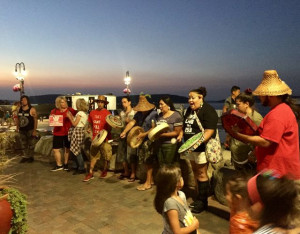
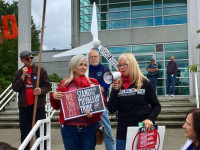
Tacoma, Washington is one of the few cities in the Northwest where there is a long legacy of heavy industrial contamination. The fossil fuel industry plays a big role in the local economy, but Tacoma residents have also begun to fight back against further fossil fuel development. Two years ago community activism stopped the world’s largest methanol refinery from being built, but meanwhile plans quietly moved forward to build a new liquid natural gas (LNG) facility at the Port. This current project is facing fierce opposition from the Puyallup Tribe as well as many local residents.
On this episode of Locus Focus, we talk with Claudia Riedener, an organizer with Redefine Tacoma, an organization that fights for environmental justice and advocates for clean energy, clean industry, and clean jobs, in a city that has a long history of just the opposite.
https://kboo.fm/media/64229-redefining-tacoma
___________________________________________
”The Nation’s Largest Oil-by-Rail Terminal Meets its Maker”
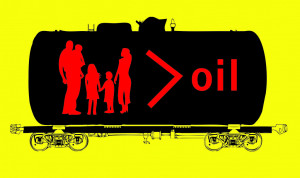
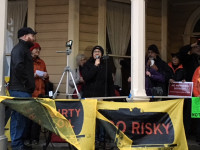
For four and a half years community and climate activists, health care workers, teachers, longshoremen and first responders in the Portland-Vancouver region have been working hard to stop the largest oil-by-rail terminal in North America, from being built at the Port of Vancouver, Washington. On January 29, 2018, their persistent organizing paid off when Washington State governor Jay Inslee rejected the Tesoro-Savage oil shipping terminal as “not in the best interests of the state and its people.” That afternoon at least 100 activists and elected officials gathered across the street from Vancouver City Hall to celebrate.
On this episode of Locus Focus, we celebrate with them the near-certain demise of this behemoth threat that has hung over the community since 2013. We talk with Linda Garcia, a neighborhood activist from the Fruit Valley neighborhood in Vancouver, just blocks from where the terminal would have been sited, and Regna Merritt, with Oregon Physicians for Social Responsibility, one of the lead organizations in the fight to stop the terminal.
”Attack of Fracked Gas in the Northwest”
Air date: Mon, 02/12/2018 – 10:00am to 11:00am, KBOO Radio, Portland, Oregon
On this episode of Locus Focus we talk with Longview, WA community activist Diane Dick about the world’s largest methanol refinery being proposed for Kalama, WA – 9 miles south of Longview – and the growing opposition it has sparked. But first we talk about LNG.”
”The Thin Green Line in 2018”
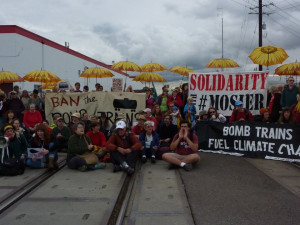

Donald Trump is targeting the Pacific Northwest for accelerated fossil fuel development. He brought the Jordan Cove LNG terminal in Coos Bay back from the dead, designating it as the highest priority site for LNG development on the West Coast. And now he is opening up the coastal waters of Oregon, Washington and California to oil drilling. In doing so he is trying to cross a thin green line of resistance that obviously he knows or cares little about.
On this episode of Locus Focus we talk again with Dan Serres, Columbia Riverkeeper’s Conservation Director, about how the Thin Green Line is holding firm against all the onslaughts of fossil fuel development being thrown at us. We’ll look at the victories and coming challenges facing us this year.
Dan Serres started with Columbia Riverkeeper in 2005, as the lead organizer in their successful campaign to protect the Columbia River Estuary, forests, and farmland from the Bradwood Landing and Oregon LNG Liquefied Natural Gas (LNG) proposals and their related pipelines. Since 2009, he has filled the role of Conservation Director where his work has broadened to protecting the Columbia River from a barrage of dirty fossil fuel export proposals including LNG export terminals, coal export terminals, oil-by-rail facilities, and power plants. Dan is also a member of the Hanford Advisory Board, where he speaks up as a public voice demanding faster and more robust cleanup of North America’s most contaminated nuclear site.
”Kalama Methanol Refinery Update”
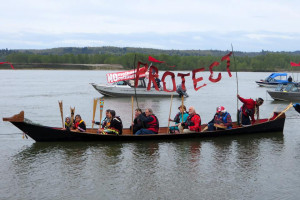
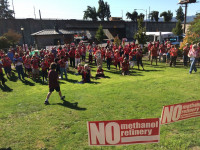
As the fossil fuel industry targets the Pacific NW for massive fossil fuel development, communities across the region have drawn a thin green line of resistance. Most of these proposals are being vehemently opposed, but on either side of the Lower Columbia River, the largest methanol refineries in the world are poised to be approved.
On this episode of Locus Focus we talk again with Jasmine Zimmer-Stucky, Senior Organizer with Columbia Riverkeeper, about the latest developments with Northwest Innovation Works’ plans to build a gigantic methanol refinery in Kalama, and the resistance that continues to build.
Jasmine Zimmer-Stucky‘s role at Columbia Riverkeeper is to inform and engage residents in Oregon and Washington on coal export and oil terminals that would transform the scenic Columbia River Gorge into a dirty energy corridor. Jasmine led the public campaigns to stop would-be coal export terminals from polluting Oregon’s air and water and now focuses on doing the same in Southwest Washington.
”Portland’s Fossil Fuel Infrastructure Ban Hits an Obstacle”
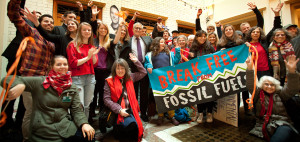
On July 19, 2017 the Oregon Land Use Board of Appeals (LUBA) ruled that Portland’s Fossil Fuel Terminal Zoning Amendments, passed unanimously in December of 2016, is inconsistent with the Commerce Clause of the U.S. Constitution. Portland’s fossil fuel policy intended to prevent new major fossil fuel infrastructure projects in the City. This ruling is likely to be appealed to the State Court of Appeals.
On this episode of Locus Focus we talk with 350PDX Lead Organizer and Development Coordinator Mia Reback about what the LUBA ruling means for Portland’s ability to determine its own fossil fuel-free future.
”Northwest Targets”
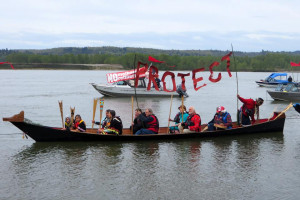
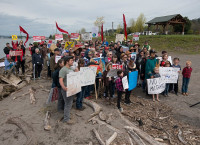
Please note: Locus Focus now starts at 10 am.
For the past decade numerous communities across the Northwest have defended a thin green line, stopping or delaying fossil fuel projects that would dramatically alter the fabric of this region. But the fight is far from over.
On this episode of Locus Focus, we talk again with Eric de Place, Policy Director for Sightline Institute in Seattle (who coined the phrase “thin green line” to describe the Northwest’s stand against fossil fuel development) about Northwest communities that are still under immediate threat from dirty energy development.
Eric de Place is a researcher, writer, speaker, and policy analyst and spearheads Sightline Institute’s work on energy policy. He is known as a leading expert on coal and oil export plans in the Pacific Northwest, and he is considered an authority on a range of issues connected to fossil fuel transport, including carbon emissions, local pollution, transportation system impacts, rail policy, and economics. He has researched and published more than two hundred articles, reports, and analyses on these proposals, and his work on fossil fuel transport is cited by regional and national news media outlets hundreds of times each year.
Zoltan Grossman on his book ”Unlikely Alliances: Native Nations & White Communities Join to Defend Rural Lands
Air Date: July 8, 2017, podcast, KEXP Radio, Seattle, WA
Producer: Diane Horn for Mind over Matter Sustainability Segment
”Mosher Oil Train Derailment Anniversary”
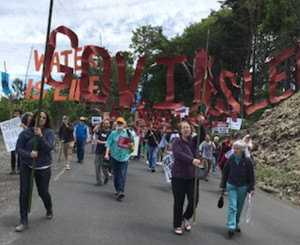
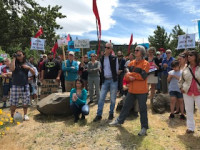
On June 3 of last year, an oil train derailed in the Columbia River Gorge in the little town of Mosier. Several cars caught fire and burned for 14 hours. If the normal Gorge winds had been blowing that day, Mosier would been destroyed, like Lac-Megantic.
On the first anniversary of this near disaster, hundreds of people gathered at the Mosier Community School to call for stopping oil trains from traveling through the Gorge. On this episode of Locus Focus, we listen to speeches from that rally. We’ll hear from Ryan Rittenhouse with Friends of the Gorge; Carina Miller, Confederated Tribes of the Warm Springs Tribal Council Member; JoDe Goudy, Chairman of the Tribal Council of the Yakama Nation; Vancouver City Councilmember Alishia Topper, Tacoma City Council member Ryan Mello, Mosier Physician Dr. Maria McCormick and former Hood River City Council member Laurent Picard. Then we go down the river where we’ll hear more speeches by Mosier City Council Member Acasia Berry and Cathy Sampson-Kruse, member of the Confederated Tribes of the Umatilla Indian Reservation.
EFSEC Closes Comment Period for Tesoro Savage Oil Terminal
Airdate: June 8, 2017, KBOO Radio
Produced by Desiree Hellegers for “Old Mole Variety Hour”
Yesterday evening, Washington State’s Energy Facility Site Evaluation Council, or EFSEC, closed its final hearing on the proposal to construct a 360,000 barrel-per-day crude oil trans-shipment terminal at the Port of Vancouver, Washington. Now the final decision is in the hands of Washington’s Governor Inslee, once EFSEC makes its recommendation to him. The evaluation process has been underway for several years but the Governor is expected to reach a conclusion this summer. The environmental advocacy group Columbia Riverkeeper, based in Hood River, Oregon, has played a major role in opposing this project since its inception. KBOO reporter Sam Bouman spoke with Columbia Riverkeeper’s Conservation Director Dan Serres this afternoon for more on where the project stands. KBOO reporter Tom Flynn also contributed to this story. EFSEC did not respond to a request for comment in time for broadcast.
”Mosier One Year Later”
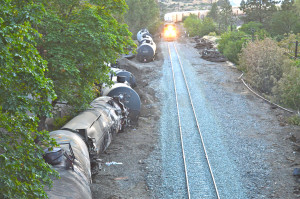
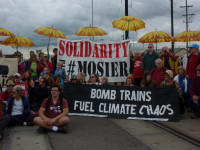
On June 3, 2016, the small town of Mosier in the Columbia River Gorge, near Hood River, made regional and national news of the most unfortunate kind. Firefighters battled for 14 hours to contain a dangerous oil fire from a derailed 96-car Union Pacific train carrying highly flammable Bakken crude oil. One year later, Mosier’s groundwater is still contaminated, and oil and railroad companies are seeking to expand oil and coal train traffic through the Columbia River Gorge, a National Scenic Area, despite opposition from Columbia River treaty tribes, the town of Mosier, and many larger cities along the potential route.
On this special edition of Locus Focus we observe the one year anniversary of the near-disaster in Mosier. We are joined by Columbia Riverkeeper’s conservation director Dan Serres and Mosier mayor Arlene Burns.
Standing Rock: Lessons Learned Parts 1 and 2
Airdate: February 20, 2017, KBOO Radio
Produced by Desiree Hellegers for “Old Mole Variety Hour”
Panel discussion on events at Standing Rock in opposition to the Dakota Access Pipeline Voices from the Feb. 2 panel on “Standing Rock: Lessons Learned,” sponsored by the NW Neighborhood Chapter of 350pdx, featuring Jacqueline Keeler, Dineh Yankton Dakota journalist and activist; Roben White, Cheyenne Lakota artist and activist; Maya Jarrod, organizer with 350pdx; and activist Mike Horner. Produced by field mole Desiree Hellegers.
Part 1:
Part 2:
”Fighting Trump’s Fossil Fuel Agenda on the Local Level”

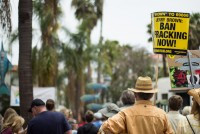
This program originally aired on February 13, 2017
It’s hard not to be disheartened by the news everyday coming from the Trump-occupied White House. But one way to stay energized is to resist at the local level.
As the Trump Administration’s federal policies look to favor the fossil fuel industry, state and local authority, especially the power of regulating land use, will likely play an increasingly important role in protecting regions like the Northwest from the risks of coal, oil, and gas. Indeed, threatened by a tsunami of energy export projects, a number of cities and counties in the Northwest are defending themselves from new energy export projects by reforming their land use and development codes.
On this episode of Locus Focus we talk with Sightline Institute’s Policy Director Eric de Place about how local resistance to the Trump agenda is not just a West Coast phenomenon. We look at how local governments across the US are experimenting with a variety of opposition strategies to protect themselves from volatile oil trains, widespread fracking, and offshore oil drilling. So listen and take heart!
Eric de Place, Policy Director, spearheads Sightline Institute’s work on energy policy. He is known as a leading expert on coal and oil export plans in the Pacific Northwest, and he is considered an authority on a range of issues connected to fossil fuel transport.
Poet Kathy Jetnil-Kijiner
Airdate: March 27, 2017, KBOO Radio
Produced by Desiree Hellegers for “Old Mole Variety Hour”
Probably best known for having performed her poetry at the opening of the United Nations Climate Summit in New York in 2014, activist and artist Jetñil-Kijiner talks here with Desiree about poetry for the people, the impact of US imperialism and climate change on her home islands, and more; she also performs some of her poetry. Her writing and performances have been widely published, and her first poetry collection was recently released by University of Arizona Press, Iep Jāltok: Poems from a Marshallese Daughter.
”The Largest Methanol Refinery in the World”
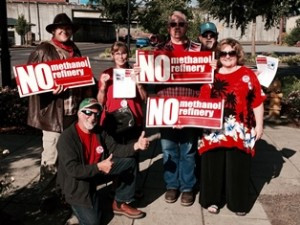
As this year draws to a painful close, amidst all the political debris, we can look back at some major environmental successes. Communities across the Pacific Northwest have stopped proposals to build coal terminals in Washington and Oregon, a giant methanol refinery in Tacoma. LNG export terminals in the Columbia River estuary and hopefully Coos Bay. The Northern Gateway pipeline slated to carry tar sands oil across northern British Columbia was terminated by Justin Trudeau’s new national government in Canada. And the Portland City Council passed an ordinance banning all future fossil fuel export facilities in the city. Yet there is still a lot of work ahead to hold the Northwest’s Thin Green Line of resistance against fossil fuel development.
On this episode of Locus Focus we talk with Jasmine Zimmer-Stucky, senior organizer with Columbia Riverkeeper, and Kalama activist Gary Wallace, about one of the remaining gargantuan fossil fuel projects being fought in Kalama, Washington. Northwest Innovation Works wants to build the world’s largest methanol refinery on the banks of the Columbia River, that would convert natural gas to methanol for export to China to produce plastics. Like all the other mega fossil fuel projects being proposed across the region, the Kalama refinery is being met with fierce opposition from community members. We’ll talk with Jasmine and a Kalama community organizer about why so many people around Kalama do not believe that a methanol refinery would benefit their community in any way.
Jasmine Zimmer-Stucky‘s role with Columbia Riverkeeper is to inform and engage residents in Oregon and Washington on coal export and oil terminals that would transform the scenic Columbia River Gorge into a dirty energy corridor. Jasmine led the public campaigns to stop would-be coal export terminals from polluting Oregon’s air and water and now focuses on doing the same in Southwest Washington.
Gary Wallace is a longtime Kalama resident who has been leading the resistance to local fossil fuel projects in the Kalama-Kelso-Longview, Washington area.
”Youth Take on Climate Change”
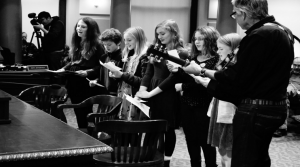
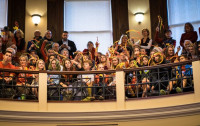

On December 14 the Portland City Council unanimously passed an historic ordinance banning new bulk fossil fuel terminals in the city, a bold move that commits the city to transition away from fossil fuels. This victory for climate justice is the result of over two years of grassroots organizing. Some of the most stunning voices in the struggle were those of young people, whose clarity in the face of impending climate disaster, visibly influenced the powers that be.
On this episode of Locus Focus, we speak with one of these student activists, Ella Shriner, a freshman at Grant High School, and her former teacher Jan Zuckerman, who was one of the founders of the Environmental Middle School, which morphed into Sunnyside Environmental School, where Jan taught for years. Jan devotes a lot of her time working for climate justice, and is active with the Climate Action Coalition and the Portland Public Schools Climate Justice Committee.
Indigenous Response to Standing Rock Ruling
Airdate: December 12, 2016, KBOO Radio
Produced by Desiree Hellegers for “Old Mole Variety Hour”
Desiree Hellegers speaks with Yup’iaq biologist and musician Carl Wassilie and Salish Kootenai environmental sociologist Nikos Pastos about Indigenous People’s Day, their journey to Standing Rock, and their work with Alaska’s Big Village Network. If you’re interested in learning more about their journey to Standing Rock or about how you can support their work, you can reach Carl and Nikos on the road at 406-459-1829, or by emailing nikospastos@hotmail.com, or carlwassilie.acyn@gmail.com or or see their blog at akbigvillagenetwork.blogspot.com. The segment was pretaped on October 8. Special thanks to Gregory Sotir for coordinating the interview.
”Standing Rock and the Trans Mountain Pipeline”
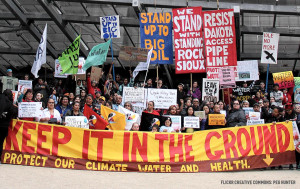
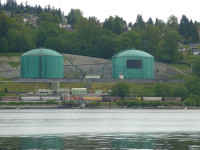
As we continue to try to make sense of where the world is hurtling toward as Donald Trump prepares to become the 45th president of the United States, we follow up on last week’s discussion about the fight to keep gigantic fossil fuel projects from being built in the Northwest. Sunday, December 4, we heard the amazing news that the Standing Rock Sioux water protectors won their battle, at least for now, to stop the Dakota Access Pipeline from contaminating their water supply. This was much needed good news after hearing earlier that week that the the Canadian Federal Government had approved Kinder Morgan’s proposed expansion of the Trans Mountain pipeline carrying tar sands oil across British Columbia. On this episode of Locus Focus, we’re joined by Eric de Place, Policy Director for Sightline Institute in Seattle to talk about the connections between these two pipeline struggles and the forces we are trying to stave off that would turn the Pacific Northwest into a fossil fuel export hub. As the Trans Mountain pipeline threatens to become a reality will we see another Standing Rock-like movement led by First Nations and Pacific Northwest tribes take off across the Northwest?
Eric de Place, policy director, spearheads Sightline Institute’s work on energy policy. He is known as a leading expert on coal and oil export plans in the Pacific Northwest, and he is considered an authority on a range of issues connected to fossil fuel transport. Eric is a frequent guest on Locus Focus.
”Holding the Thin Green Line in Trumpland”
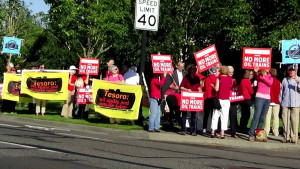
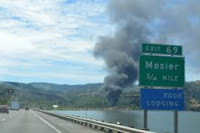
With the election of Donald Trump as the next president of the United States, how do we go forward to protect the Pacific Northwest from the ravages of fossil fuel development?
On this episode of Locus Focus we talk with Dan Serres, Columbia Riverkeeper Conservation Director, about the status of current campaigns to ban fossil fuel infrastructure development in the Portland-Vancouver region as well as the world’s largest proposed Methanol refinery in Kalama, Washington. We look at the the power we maintain as a region to hold the line on local fossil fuel development and the Northwest’s fortuitous position to block the export of much of the nation’s fossil fuels.
Dan Serres started with Columbia Riverkeeper as the lead organizer in a successful campaign to protect the Columbia River Estuary, forests, and farmland from the Bradwood Landing and Oregon LNG Liquefied Natural Gas (LNG) proposals and their related pipelines. Since 2009, he has filled the role of Conservation Director where his work has broadened to protecting the Columbia River from a barrage of dirty fossil fuel export proposals including LNG export terminals, coal export terminals, oil-by-rail facilities, and power plants. Dan is also a member of the Hanford Advisory Board, where he speaks up as a public voice demanding faster and more robust cleanup of North America’s most contaminated nuclear site.
Carl Wassilie and Nick Pastos on the way to Standing Rock
Airdate: October 10, 2016, KBOO Radio
Produced by Desiree Hellegers for “Old Mole Variety Hour”
Desiree Hellegers speaks with Yup’iaq biologist and musician Carl Wassilie and Salish Kootenai environmental sociologist Nikos Pastos about Indigenous People’s Day, their journey to Standing Rock, and their work with Alaska’s Big Village Network. If you’re interested in learning more about their journey to Standing Rock or about how you can support their work, you can reach Carl and Nikos on the road at 406-459-1829, or by emailing nikospastos@hotmail.com, or carlwassilie.acyn@gmail.com or or see their blog at akbigvillagenetwork.blogspot.com. The segment was pretaped on October 8. Special thanks to Gregory Sotir for coordinating the interview.
Link to KBOO and audio file (takes you to external website).
Report from the Mosquito Fleet
Airdate: July 18, 2016, KBOO Radio
Produced by Desiree Hellegers for “Old Mole Variety Hour”
People on the scene of the protest against oil in Puget Sound voice their views. Desiree Hellegers interviews activists with the Mosquito Fleet, an emerging grassroots direct action activist group that grew out of last summer’s Shell No! protests. Touching on the links between militarism, oil and climate change, the interviews were conducted outside Hoquiam City Hall during the Quinault Indian Nation’s July 8 “Shared Waters, Shared Values” protest, and on July 14 in Portland’s Cathedral Park.
Link to KBOO and audio file (takes you to external website).
Quinault Rally Against Oil Terminal Expansion
Airdate: July 11, 2016, KBOO Radio
Produced by Desiree Hellegers for “Old Mole Variety Hour”
Field Mole Desiree Hellegers covers voices from the Quinault Indian Nation’s Shared Waters, Shared Values March and Rally from this past Saturday. The event brought together a Native canoe flotilla and non-native kayaktivists in a show of resistance to the proposed expansion of an existing oil terminal in Grays Harbor.
Vancouver 21 Direct Action
Airdate: June 27, 2016, KBOO Radio
Produced by Desiree Hellegers for “Old Mole Variety Hour”
Desiree Hellegers speaks with Imogene Williams and Lowen Berman, two of the twenty-one activists who were arrested at the Vancouver, Washington oil train protest and blockade on June 18.
Voices from Anacortes Protests
Airdate: May 23, 2016, KBOO Radio
Produced by Desiree Hellegers for “Old Mole Variety Hour”
Desiree Hellegers shares field recordings she made in Anacortes, WA where dozens of activists were arrested for protesting fossil fuel recently. In the first of a two-part series, this week Desiree Hellegers shares field recordings she made in Anacortes, WA where dozens of kayaktivists were arrested for protesting the Tesoro fossil fuel plant recently. You can find her article about recent protests, “‘Energy Without Injury’: From Redwood Summer to Break Free via Occupy Wall Street,” at Counterpunch.
Climate Impacts of the TPP
Airdate: December 21, 2015, KBOO Radio
Produced by Desiree Hellegers for “Old Mole Variety Hour”
Desiree Hellegers hosts a round table discussion on the climate impacts of the Transpacific Partnership, featuring Miya Reback, development and campaign coordinator for 350.org Portland, Kristen Sheeran, Oregon Director for Climate Solutions, and Michael Shannon, Executive Director, Oregon Fair Trade Campaign. They also recommend the work of Renew Oregon.
Columbia Riverkeeper: Saving the NW and Planet
Airdate: October 19, 2015, KBOO Radio
Produced by Desiree Hellegers for “Old Mole Variety Hour”
Desiree Hellegers talks with Dan Serres of Columbia Riverkeeper about the fossil fuel struggle. They discuss the disastrous effects of the planned Liquified Natural Gas Export Terminals and the need to stand up to the oil companies. They mention the successful citizen action to stop the Bradwood LNG project, and also note an upcoming event for more information and to make connections with others working on these issues.
Link to KBOO and audio file (takes you to external website).
Field Moles: Shell No in St. John’s
Airdate: August 17, 2015, KBOO Radio
Produced by Desiree Hellegers for “Old Mole Variety Hour”
Field recording from the July 30th Shell No action in St. Johns Desiree Hellegers brings a field report from Portland’s Cathedral Park where activists on July 29th attempted to delay the transit of Shell Oil’s icebreaker on its way up to the Arctic. The segment features the voice of Greenpeace climber Marty Aranaydo, founder and director of the Indigenous Peoples Power Project.
Link to KBOO and audio file (takes you to external website).
Oil Terminals and the Quinault Nation
Airdate: June 29, 2015, KBOO Radio
Produced by Desiree Hellegers for “Old Mole Variety Hour”
Desiree Hellegers interviews Quinault fisherman Junior Goodell about the battle to stop the construction of two oil export terminals slated for Grays Harbor, WA. A hearing on the draft environmental impact statement on the terminals will be held later in July, with more information on dates and bus transportation to the hearings available here. Goodell’s op ed piece entitled “Grays Harbor oil terminal would threaten Quinault Indian identity” appeared in the June 1 edition of the Seattle Times.
Link to KBOO and audio file (takes you to external website).
Winona LaDuke Interviews Zoltan Grossman
Airdate: 7/2/14, KKWE Niijii Radio, Callaway, MN
Winona speaks with Dr. Zoltan Grossman, a professor at Evergreen college in Geography. With Zoltan, Winona discusses some of his work – that of the social history of unlikely alliances. First, Winona and Zoltan discuss Wounded Knee, the creation of the white working class and the various forms of resistance to white domination and settler colonialism – by Indigenous people and non-Indigenous settlers – over the past few hundred years. Winona and Zoltan discuss multi-national corporations, anti-colonial campaigns and sovereignty movements, earlier examples of alliances of cowboys and Native people, and long-standing resistance by Indigenous communities and some allied settlers. Zoltan is working on a book for the University of Washington Press, called “Unlikely Alliances”. On today’s show, Zoltan goes into detail about the conditions that create successful alliances and resistance, and gives examples such as Wisconsin, where the state has a reputation as one of the “hardest places in the world to put a mine” (1). Finally, Zoltan and Winona discuss treaties, resistance, historic legal cases such as the Bolt decision and what Zoltan calls “decolonizing the landscape”. Source: 1. Seely, R. (2011). “Mining in Wisconsin: Promise or peril?”. Wisconsin State Journal. From: http://host.madison.com/news/local/environment/mining-in-wisconsin-promise-or-peril/article_a41d450d-bcd4-5b10-abd5-06982ac2bf57.html